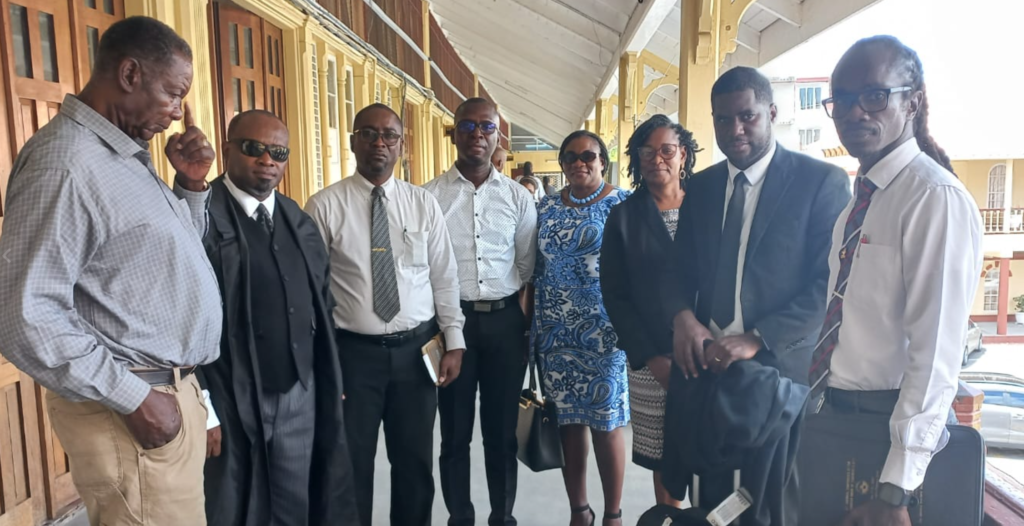
By Svetlana Marshall
Justice Sandil Kissoon has indicated that he will hand down his ruling next Friday in the case brought against the Government of Guyana by the Guyana Teachers’ Union over its plan to deduct money from the salaries of teachers for their striking days and the decision to discontinue deducting union dues from the salary of teachers for the union.
Justice Kissoon made his announcement about the date for his decision today after hearing legal arguments in the case.
Attorney for the Guyana Teachers’ Union, Darren Wade and Attorney for the Guyana Trades Union Congress, Senior Counsel Roysdale Forde, argued that Government’s failure to engage the Union in collective bargaining for well over three years, despite being presented with a multi-year proposal since 2020, created the conditions for industrial action, and as such, the principle of “no work, no pay” is not applicable in this instance.
“Today, the essence of my argument established the principle of no work, no pay was inapplicable to Guyana. Secondly, to establish that the role and functioning of the Chief Labour Officer and the Minister of Labour aggravated the circumstances which led to the strike,” Forde told reporters at the conclusion of the legal arguments.
Mr. Forde explained that following the break down in talks between the GTU and the Ministry of Education, the union sought the intervention of the Chief Labour Officer for the initiation of conciliation and later arbitration, but to no avail.
It was noted that in a belated response, the Chief Labour Officer indicated that the conditions for arbitration had not been met.
However, Senior Counsel Forde told the Court that the evidence presented to the Court, during the cross examination of the Chief Education Officer (CEO) Saddam Hussain, revealed that no real negotiation took place, and many of the measures reportedly implemented by the Education Ministry were unilaterally done, and not in keeping with the proposals of the Union.
“I believe that the evidence which we received from the Chief Education Officer clearly establishes that the Government acted, on numerous instances, in a dictatorial and unilateral manner. The Government proceeded over the last three years to impose wage increases, and those are matters, which form part of the collective bargaining proposal, which had been submitted, and those matters were never dealt at the bargaining table. There were other instances where the Government unilaterally proceeded to implement and adopt certain items without the context of a collective bargaining taking place,” Forde said.
Attorney General, Senior Counsel Anil Nandlall argued that the proceedings filed by the GTU are incurably detective.
He submitted to the Court that a significant portion of the arguments put forward by both Forde and Wade do not form part of their pleadings, including the issue of collective bargaining.
Addressing the substantive issue of whether the teachers should be paid despite engaging in industrial action, the Attorney General told the Court that while teachers, like other categories of workers, have the freedom to strike, they do not have the right to strike, and therefore, they should have to face the consequences of their action.
“I believe that I demonstrated with great clarity, on examining the constitution, the 1966 Constitution, the 1980 Constitution, the 2001 Constitution and all the changes that have taken place in relation to trade unions, and in relation to rights to strike and freedom to strike that there is no right to strike in Guyana, there is a freedom to strike. The Constitution has a right to demonstrate, a right to assemble and a freedom to strike, so the draftsman using language differently. Then you have the right of the employer. The Constitution also protects the employer’s right to property, so how could you advocate that you have a right to pay when you have not worked,” the Attorney General said.

On the issue of the union dues not being deducted on behalf of the union, the Attorney General said it was an executive decision taken by the Government, and the Court cannot intervene in such a matter, since there was no contractual agreement. He noted that the remittance of the union dues to the GTU was done on a voluntary basis.
“Matters that are within the remit of the executive cannot be reviewed by the Court. And that is why in the GPSU matter, for example, with Nanda Gopaul, they did not go for judicial review because the voluntary service of the Government in offering this facility to the Union is not grounded in contract, it is not grounded in law, it is the Government, as part of its policy decided to extend this service to the Union voluntarily and anything that is voluntarily done can be terminated voluntarily,” the Attorney General told reporters, as he summed up his arguments in Court.
However, GTU’s Attorney, Darren Wade dismissed the contentions of the Attorney General. He told reporters that he was pleased with the submissions to the Court.
“I believe that myself and Mr Forde, who represented the intervenor did an excellent job in presenting our legal arguments before the Court, the arguments in relation to the right to strike, I believe that there are several legal authorities, as I did indicated to the Court, that are instructive,” Wade said.
Mr. Wade maintained that the teachers had a right to strike, and their salaries should not be affected. Both Wade and Forde, also argued that it was discriminatory for the Government to halt the deduction of union dues from the salaries of teachers, when no such decision was taken in the case of other unions whenever their workers went on strike.











You must be logged in to post a comment Login